Results 1 to 5 of 5
Thread Information
Users Browsing this Thread
There are currently 1 users browsing this thread. (0 members and 1 guests)
-
09-18-2014, 08:37 AM #1Banned

- Join Date
- Jun 2013
- Posts
- 8,546
Why the Scottish Should Vote 'Yes' on Independence
Why the Scottish Should Vote 'Yes' on Independence
Scotland gave the world the Enlightenment. It's time for the modern heirs of Adam Smith and David Hume to claim their freedom.
And so ends the old order,
With Indyref fever full boil.
Lefties campaign for a border,
Greenies shout Yay for the oil.
—Rosie Bell
RELATED ARTICLES- UK's Cameron Uses Guilt Trip to Beg Scots to Stay
9.15.14 - Polling Boosts Scottish Independence Hopes
9.08.14 - Snowden Elected Rector at Glasgow University
In May 2011—almost a year to the day after I moved to Edinburgh—the Scottish National Party (SNP) won a parliamentary majority in the Holyrood elections. This, of course, was supposed to be impossible. Scotland's electoral system—in place since devolution in 1998—was designed to prevent majorities.
That result meant a referendum on Scottish independence became inevitable, although it was clear that achieving a "yes" to independence was always going to be a struggle. Not only did many people vote SNP in 2011 because they were furious with Scotland's other political parties; thanks to the country's idiosyncratic electoral boundaries, the SNP won a majority of seats (53.49 percent) with a plurality of the popular vote (44.04 percent).
For a long time, this political reality was reflected in the polls: the "yes" vote lagged behind, often by as much as 20 percent. Both campaigns lacked energy, and debate was restrained. Commentary focussed on the civility of the Scottish people, and the lesson in citizenship the country was giving the world, without appreciating that the civility often had its roots in a lack of engagement.
My first inkling that the debate over "Indyref," as it is called in Scotland, was changing in tone was when, as a lawyer at a commercial law firm, the partners told my colleagues and me not to take a public stance on the vote. Potential clients were starting to choose their advisers based on which way the firm in question was perceived to lean on independence. At first I thought it was just my firm, but word filtered back to me from friends in other firms: they'd received the same instruction, too.
Soon after, the polls began to narrow. Indyref debates around the country—once merely well attended—filled to bursting point. There was violence in Glasgow. The numbers registering to vote rose to unprecedented levels. Turnout on September 18 may well exceed 85 percent. People have been warned of long lines at voting stations.
Last week, the polls crossed for the first time, with "yes" taking a narrow lead. At time of writing, the result remains too close to call. The British pound sank against the U.S. dollar on the news, while the London Stock Exchange developed a notable case of the jitters.
Both camps have prepared detailed manifestos—running to hundreds of pages—outlining their vision for Scotland's future. The "no" camp, recognising the popularity of devolution, has promised more local autonomy for Scotland, and it is difficult to see how—assuming "no" wins on Thursday—the U.K. will avoid a federal political settlement of some sort.
Meanwhile, the "yes" camp has run hard on the political differences between Scotland and England. The Conservative Party is weak in Scotland: The country turned its face decisively against the Tories in the wake of Thatcherism. For all that Thatcher's economic reforms benefited the U.K. as a whole—and they did, enormously—many Scots remember the decay of shipbuilding on the Clyde and the Poll Tax (introduced a year earlier in Scotland than in England). The latter led to widespread tax resistance and, sometimes, riots. “Yes” has spoken often of a kinder, gentler, more equal, more progressive country than is Scotland's large neighbour to the south.
At least in recent times, the political differences have been marked on a national level. Remove Scotland from the rest of the U.K. in the general elections of 1964, 1974, and 2010 and the result would have been decisive Conservative majorities. However, the 2014 European Parliament elections were a salutary reminder that Scotland is less different from England than it thinks: The anti-EU, anti-immigration UKIP also polled well. Indeed, the combined UKIP and Conservative vote was greater than Labour's, and only just behind the SNP's.
Indyref's true complexity is incapable of description here, but four issues remain central. They are, in no particular order: oil, E.U. membership, currency, and pensions.
The SNP campaigned over many years for a greater return of North Sea revenues to Scotland (91 percent falls into Scottish territorial waters). Recent scaremongering about the North Sea running out of oil and gas by the "no" camp fails to recognise that it is a basic economic truth that oil fields remain productive at the margins while oil prices remain high. That it is more difficult to recover the resource matters little when there is still money to be made.
However, the U.K.'s tax regime encourages exploration in difficult-to-access oilfields, meaning that no government—including that of an independent Scotland—can keep the rate of return on oil and gas revenues constant.
When it comes to E.U. membership, it seems that an independent Scotland would eventually accede, but eventually is the key word. Many E.U. member states require referendums in their own countries before the larger trading bloc can admit a new country, and no member state of the E.U. has previously broken up with the smaller bit then applying to join.
This leaves lawyers in Brussels not only rather short of precedents, but also with awareness that Spain has serious separatist movements of its own. Inspired by the Scots, the Catalans and Basques may make a run for it. Both "yes" and "no" have mishandled the E.U. membership issue, failing to understand the legal complexities and, in some cases, providing information that is simply wrong: at one point, "yes" falsely claimed that Scotland would automatically become an E.U. member.
Spooked by the ailing euro across the channel, the Labour and Conservative Parties alike have rejected currency union with an independent Scotland. Scotland’s First Minister, Alex Salmond, says that England is bluffing, and he may be right, but it remains true that currency union without true political or fiscal union is economic nightmare fuel, something the slow-motion train wreck of the euro seems to evince at least once a week.
As an alternative to formal currency union, "yes" has proposed "sterlingisation," where Scotland—much as Panama does with the U.S. dollar—uses the pound without England's permission. This would leave an independent Scotland without a central bank or a lender of last resort. It would undermine the SNP's plans for a debt-fuelled, social democratic utopia: The austerity would be swift and severe, any socialism followed by an aggressive move to free markets and deregulation. However, it would also impose prudence on Scotland's banks and probity on the financial sector, insulating Scotland from nasties like the Global Financial Crisis.
While oil, E.U. membership, and currency have been central to the debate for some time now—the sheer scale of the pensions crisis, both as it applies to the U.K. as a whole and a putative independent Scotland—has only come to the fore as the polls have narrowed. Americans often expectorate about their country's social security black hole, but the U.K.'s is off the scale. The state pension is a genuine Ponzi scheme: Current revenues are paying for current entitlements, combined with an ever-growing pool of recipients.
(Page 2 of 2)
Within the U.K., Scotland's position is worse: its population is both older and sicker than that of England and Wales. The crisis would bite sooner, with public sector net borrowing (what needs to be borrowed over and above tax revenues) rising from 4 percent this decade to around 10 percent by mid-century. In short order, public debt would rise to 200 percent of GDP—and, as one commentator put it this week, "that's a larger hole than the one Greece is in."
When I departed the U.K. to work in Australia, I deliberately left my Indyref polling card behind. I thought it improper to vote on the future of a country in which I no longer lived. The wisdom of my decision was brought home to me while writing this piece. Were I still practising corporate law in Edinburgh, I would vote "no." Concerns for my future as a lawyer and the viability of Scottish companies would trump any desire to see something of an uncontrolled experiment with sterlingisation.
From afar, though, I hope "yes" wins the day, because I also think Scotland's robust civic culture would make a fair fist of independence. The socialism would evaporate, sure, but the country would not fall prey to the "resource curse" so common among small, oil-rich nations. That Scotland gifted the world the skeptical Enlightenment would stand it in good stead. Its current inhabitants may prove themselves worthy heirs to Adam Smith, David Hume, and all the rest.
Very glad I left that polling card behind.
Helen Dale is senior advisor to Senator David Leyonhjelm, Liberal Democrats Senator for New South Wales, Australia's first libertarian federal parliamentarian elected on a classical liberal ticket. Previously, she practised corporate law in Edinburgh, Scotland. She qualified in English law at Oxford University, and in Scots law at Edinburgh University.
http://reason.com/archives/2014/09/1...te-yes-on-inde
-
09-18-2014, 09:13 AM #2Banned

- Join Date
- Jun 2013
- Posts
- 8,546
Shared publicly - 6:04 AM
21st Century Fox Chairman and CEO Rupert Murdoch on Scotland’s independence vote, David Cameron, the U.S. economy, terror threats, why he pulled out on the Time Warner deal and his take on 2016 U.S. presidential candidates.
Rupert Murdoch weighs in on Scotland’s independence vote
video.foxbusiness.comLast edited by kathyet2; 09-18-2014 at 09:20 AM.
-
09-19-2014, 09:42 AM #3Banned

- Join Date
- Jun 2013
- Posts
- 8,546
Results of Scotland independence referendum: 'No' campaign victorious
By Euan McKirdy, Laura Smith-Spark and Nic Robertson, CNN
updated 1:50 AM EDT, Fri September 19, 2014
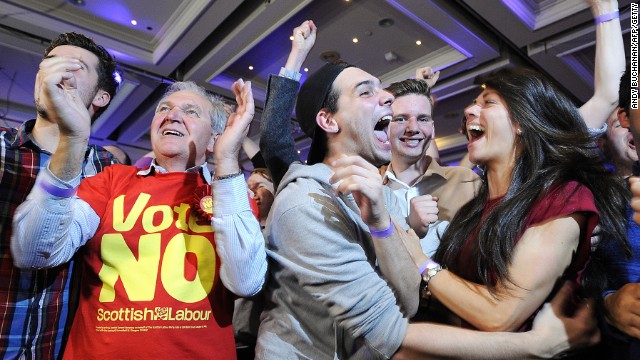
CNN forecast: Scotland staying in UK
STORY HIGHLIGHTS
- NEW: Scotland will remain part of the United Kingdom
- "No" camp wins majority of councils already declared
- With majority of councils reporting, "No" lead unlikely to be overturned
- The referendum will decide if Scotland remains part of the United Kingdom
Glasgow, Scotland (CNN) -- [Breaking news alert, 6:23 a.m. GMT (01:23 a.m. ET)]
Scotland will remain part of the United Kingdom -- along with England, Wales and Northern Ireland -- following a historic referendum vote. A majority of voters rejected the possibility of Scotland breaking away and becoming an independent nation.
With 31 of 32 councils declared, the "No" campaign has won the referendum on Scottish independence.
Scottish First Minister Alex Salmond admitted defeat in Scotland's independence referendum Friday -- and urged the rest of Scotland to do the same.
In a televised statement, he thanked Scotland "for 1.6 million votes for Scottish independence."A turnout of 86% is one of the highest in the democratic world for any such vote, he said.
[Original story published at 12.37 p.m. ET]
Voters in Scotland made their choice Thursday -- remain part of the United Kingdom, or form their own independent nation. They chose to remain.
With 31 of 32 of councils reporting, the "No" campaign had garnered enough votes to secure their victory, and with it Scotland's continued place within the union.
The first councils to declare all went to the "No" campaign, as did the capital, Edinburgh, which voted overwhelmingly to stay in the union with 123,927 for "Yes" and 194,628 "No" votes. Argyll and Bute and Aberdeenshire also voted "No."
Glasgow delivered a solid win for the independence camp with 194,779 votes for "Yes," and 169,347 for "No," but lead was not big enough to overturn the "No" camp's overall majority so far, which maintains a 8% (54% to 46%) lead over pro-independence camp.
The majority of the early results have been going the anti-independence camp's way. The "No" campaign extended lead with Angus and East Dunbartonshire council results, alongside a landslide in Dumfries and Galloway. The oil-rich city of Aberdeen also strongly voted for the unionist camp.
The city of Dundee was the first big gain for the independence campaign, voting "Yes" with 53,620 votes for, 39,880 against.
The individual counts by local authorities are ultimately immaterial as it is the total number of votes countrywide that will determine the outcome.
Polls at more than 5,500 stations across all districts, from the remote highlands and islands to the big cities of Edinburgh and Glasgow, closed at 10 p.m. local time (5 p.m. ET). People still in line to vote at that time were allowed to cast ballots.
High turnout
The first districts to report turnout reported high participation -- well over 80% in most cases -- Mary Pitcaithly, chief counting officer, announced in Edinburgh.
Turnout in Glasgow, one of the Yes campaign's heartlands, was a relatively disappointing 75%.
More than 4.2 million people registered to vote on the question: "Should Scotland be an independent country?"
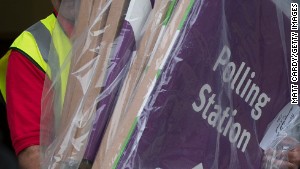 Decision day for Scotland
Decision day for Scotland
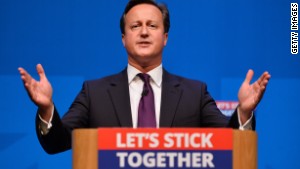 Expert: 'Yes' would humiliate Cameron
Expert: 'Yes' would humiliate Cameron
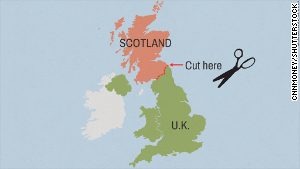 Scotland votes: See the TV ads
Scotland votes: See the TV ads
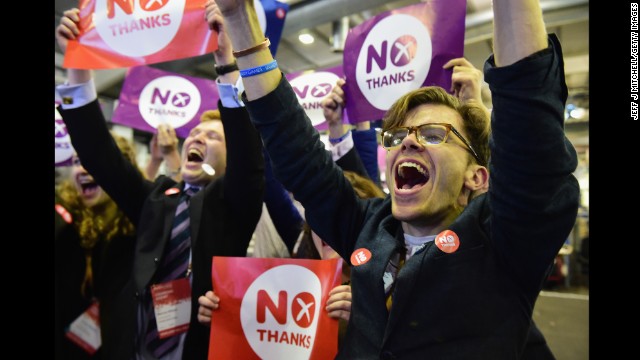 Photos: Scotland votes
Photos: Scotland votes
A vote for independence would mean Scotland, with its population of about 5.3 million, splits from the rest of the United Kingdom, made up of England, Wales and Northern Ireland, in addition to Scotland.
"The people of Scotland have engaged in this conversation," Phil MacHugh, a spokesman for the "Yes" camp, told CNN on Thursday night. "They have really gone out there, found out the information that they wanted to know, and made that choice today."
Prime minister's address
British Prime Minister David Cameron will make an address Friday morning. The content will depend on the outcome of the vote, but in the event that Scottish voters decide to stay in the union, Downing Street says he will refer to plans for further redistribution of powers from the central government to the Scottish Parliament, signed by Westminster leaders earlier this week.
The counting officer for Edinburgh, Sue Bruce, explained just after 10 p.m. that each ballot will be double-checked, to verify each voter's decision.
Addressing dozens of election workers, Bruce added, "I look forward to working with you during the course of the evening to deliver an accurate and transparent Edinburgh count in which you and the voters of Edinburgh can have full confidence."
READ: What you need to know
Voting was brisk at one polling station in Glasgow as the polls opened Thursday, with many people voting on the way to work or before taking their children to school.
Bad weather or the sheer volume of votes cast could slow down the counting process. However, the weather forecast appears good so far -- important when some ballot boxes must be collected by helicopter, plane or boat from polling stations on distant islands.
Allegations of voting fraud were reported by Glasgow City Council, with several instances of people turning up at voting booths in Scotland's largest city to vote, only to be told that they had already voted.
The Council stressed that there was never actually a situation of double voting and the affected ballots are now being searched for and taken away.
Scotland's First Minister Alex Salmond, who has led the pro-independence "Yes Scotland" campaign, cast his ballot Thursday morning in the village of Strichen, Aberdeenshire.
Labour lawmaker Alistair Darling, who has headed the pro-union "Better Together" campaign -- backed by the main parties in Westminster -- voted in Edinburgh, while former Prime Minister Gordon Brown, another pro-union campaigner, voted in the town of Kirkcaldy.
For the first time, the vote was extended to 16- and 17-year olds living in Scotland. Nearly 110,000 people younger than 18 have registered to vote.
Voters in the referendum did not have to be British citizens; Commonwealth, Irish and EU citizens who live in Scotland and are registered to vote there can cast a ballot. However, Scots living outside Scotland do not have a say.
Nearly 790,000 people applied for a postal vote -- the largest volume of registration for postal votes ever in Scotland.
After the polls closed, Salmond tweeted, "This has been a remarkable day. Scotland's future truly is in Scotland's hands."
CNN's Nic Robertson reported from Glasgow, Laura Smith-Spark wrote and reported in London and Euan McKirdy wrote and reported in Hong Kong. CNN's Richard Allen Greene, Lindsay Isaac and Greg Botelho contributed to this report.
http://www.cnn.com/2014/09/18/world/...pendence-vote/
-
09-19-2014, 09:47 AM #4Banned

- Join Date
- Jun 2013
- Posts
- 8,546
Scotland's vote on independence: What you need to know
By Laura Smith-Spark, CNN
updated 11:58 PM EDT, Thu September 18, 2014
3
4
5
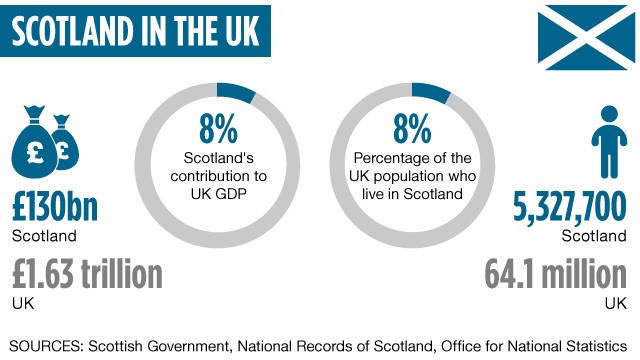
>
>>
STORY HIGHLIGHTS
- Scotland holds a referendum on independence on September 18
- A "yes" vote would mean the break-up of its 307-year-old union with England and Wales
- Opinion polls suggest the momentum may have shifted to the Yes campaign
- Prime Minister David Cameron could face resignation calls if Scotland breaks away
(CNN) -- On September 18, Scots go to the polls to vote on the future of their country.
It's a vote that could end Scotland's 307-year union with England and Wales as Great Britain -- and see it launch into the world as an independent nation of some 5.3 million people.
When campaigning began, that seemed a far-fetched prospect. But the most recent polls suggest that what many Britons consider unthinkable could happen -- and the United Kingdom as we know it could be torn asunder.
Here's what you need to know about the landmark referendum.
What are the Scottish voting on, and why?
Voters will be presented with a simple yes/no question: Should Scotland be an independent country?
The Scottish government, led by the Scottish National Party, says this is a "once in a generation opportunity" for Scotland's people to take control of the decisions that affect them most. A "yes" vote means that "Scotland's future will be in Scotland's hands," it says, and that life will be better and fairer for its people.
British Prime Minister David Cameron wants Scotland to remain part of an undivided United Kingdom of Great Britain and Northern Ireland. He says that it is a decision solely for the Scottish people -- but that remaining part of the United Kingdom will give them security and strength. "There will be no going back," he warns.
Because the United Kingdom has no written constitution, there's no established law to govern the process. So these are truly uncharted waters.
Why is this significant to the rest of the world?
The question mark over Scotland's future is already having an impact on domestic and international business. Some worry that the breakup of the United Kingdom could undermine London's standing as an international financial capital.
Last month, 130 business leaders published an open letter in which they warned of the impact of uncertainty over issues including currency, regulation, tax, pensions, EU membership and support for Scottish exports. A day later, more than 200 other business leaders signed an open letter backing an independent Scotland.
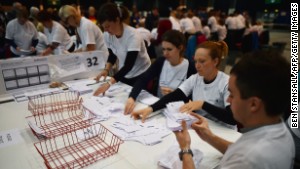 17 of 32 districts declared in Scotland
17 of 32 districts declared in Scotland
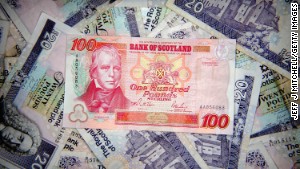 What currency would Scotland use?
What currency would Scotland use?
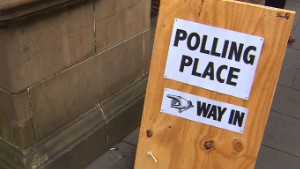 Excitement, nerves on Edinburgh's streets
Excitement, nerves on Edinburgh's streets
 Expert: 'Yes' would humiliate Cameron
Expert: 'Yes' would humiliate Cameron
The British pound sank Monday after the first poll that showed the "yes" vote in the lead, with CNN Money reporting that it reflected uncertainty over the outcome of the referendum and an increased risk of a "messy divorce."
The UK's defense capability could be affected. The Scottish government says it wants to remove nuclear weapons from Scotland as soon as possible -- namely, the UK Trident nuclear submarine fleet based at Faslane. The Scottish government says, "It is our firm position that an independent Scotland should not host nuclear weapons and we would only join NATO on that basis."
Scotland would have to renegotiate its entry to both NATO and the European Union if it votes for independence. EU leaders have signaled they would take a hard line and make Scotland apply to join like any other independent nation. However, the "yes" campaign says it could easily be done through amendments to existing treaties.
If Scotland chooses to split from Britain, it could give other people ideas.
The debate is being closely watched by independence movements in Spain's Catalonia province, Canada's Quebec province and France's Mediterranean island of Corsica.
If Scotland votes to leave, the British Prime Minister will likely come under pressure to resign -- although he has told UK media "emphatically" he will not do so. The major Westminster parties have promised to devolve more powers to Scotland if it chooses to stay in the union.
Who can vote?
Thanks to a bill passed last year extending the vote to 16- and 17-year-olds, almost everyone living in Scotland who is 16 or older on the day of the referendum will be able to vote.
This means English or Welsh citizens who reside in Scotland can take part. But Scots who are living elsewhere in the United Kingdom or overseas will not be entitled to cast a ballot.
It also means that the residents of England, Wales and Northern Ireland get no say on a historic change to the makeup of the United Kingdom.
What's the history behind the vote?
Scotland has long had a testy relationship with its more populous neighbor. The Act of Union in 1707 joined the kingdom of Scotland with England and Wales, but many Scots were unhappy at being yoked to their longtime rival south of the border.
Since 1999, Scotland has had a devolved government, meaning many, but not all, decisions are made at the Scottish Parliament in Holyrood, Edinburgh. In May 2011 the nationalist Scottish National Party, which had campaigned on a promise to hold an independence referendum, surprised many by winning an outright majority in the Scottish Parliament.
In October 2012, the UK and Scottish governments agreed that the referendum would be held, and the question to be put to voters was agreed on early last year.
Dauvit Broun, a professor of Scottish history at the University of Glasgow, said one driving force for the vote was the widening gulf between the policies pursued by the coalition UK government in Westminster, led by the Conservative Party under Cameron since 2010, and what the Scottish people want.
Many Scots are strongly opposed to the current Westminster government's attempts to reform -- or in their eyes dismantle -- the welfare state and say it was not elected by them. Illustrating that sentiment, there's only one Conservative MP in Scotland at present, leading humorists to point out that even giant pandas are better represented (Edinburgh Zoo has two.)
"Since the period of Margaret Thatcher, there has been a growing divide, and a sense that what Scotland feels consensus about ... has become more and more different to England," Broun said.
Looking further back, Scotland and England have been growing apart since the demise of the British Empire, Broun says. The decline of the Presbyterian church in Scotland, which provided a sense of self-government and Scottish identity, has also played a part in fueling the desire for independence, he said.
Who are the main players?
Scotland's First Minister Alex Salmond is the ebullient leader of the pro-independence campaign. Labour MP Alistair Darling, who represents an Edinburgh constituency, heads the pro-union Better Together campaign.
We obviously have a deep interest in making sure that one of the closest allies we will ever have remains a strong, robust, united and effective partner.
Barack Obama
The pair have taken part in two TV debates, with Darling widely judged to have come out on top in the first, by a narrow margin, and Salmond to have done significantly better in the second.
David Cameron has also spoken strongly in favor of Scotland remaining part of the United Kingdom.
It's not just UK politicians who are getting involved. Singer David Bowie, in a Brit Awards acceptance speech delivered by supermodel Kate Moss, pleaded, "Scotland, stay with us."
Former Manchester United football club manager Alex Ferguson also opposes a split and has backed the "Better Together" campaign. "800,000 Scots, like me, live and work in other parts of the United Kingdom. We don't live in a foreign country; we are just in another part of the family of the UK," he is quoted as saying.
Harry Potter author J.K. Rowling, who lives in Scotland, made a hefty donation to the Better Together campaign, and Beatles star Paul McCartney has signed a letter urging Scottish voters to stick with Britain.
The Yes campaign has its own celebrity backers -- including former James Bond star Sean Connery, actor Brian Cox, and comedian Frankie Boyle.
Actor Alan Cumming launched the Twitter campaign #goforitscotland. "What's happening now in Scotland is the most exciting political and social discourse that will forever change our destiny. Check it out!" he tweeted as the vote nears.
Even U.S President Barack Obama has gotten in on the act. He acknowledged it was a decision for the people of Scotland, but added: "We obviously have a deep interest in making sure that one of the closest allies we will ever have remains a strong, robust, united and effective partner."
What are the key issues?
Questions over the economy have dominated the debate.
The Scottish government argues the country would be better off after independence,largely based on its taking control of revenues from North Sea oil and gas found in Scottish waters. It says it would manage the energy industry better, invest to boost production, and create a wealth fund, similar to Norway's oil fund, to benefit future generations.
But not everyone agrees with the Scottish government's rosy assessment. A report by the Institute for Fiscal Studies in March said the latest figures showed Scotland's budget deficit had worsened relative to the rest of the United Kingdom, thanks to falling North Sea revenues and higher public spending north of the border. It also warned of the dangers of relying too heavily on a volatile and ultimately finite income source.
The Scottish government says the economy is diverse, with other key elements including food and drink, tourism, creative industries, universities, financial services and manufacturing.
Another big issue is what currency an independent Scotland would have.
Scottish First Minister Alex Salmond has said he wants Scotland to continue to use the pound in a currency union with the rest of the United Kingdom, and that it has the right to do so.
But the three main parties in Westminster -- David Cameron's Conservatives, their coalition partners the Liberal Democrats, and Labour -- have all said this won't be an option. The Scottish government responded that this was "bullying" from Westminster.
It's unclear what would happen to Scotland's share of UK debt if it's not part of a currency union.
What's the mood?
A series of opinion polls in past months has given the pro-union camp a lead. However, the most recent polls have shown that shrinking or disappearing altogether.
A YouGov poll conducted for The Sunday Times and released on September 7 caused waves when it showed the "yes" vote narrowly in the lead for the first time, excluding undecided voters. YouGov President Peter Kellner said it indicated support for the Better Together campaign had fallen "at an astonishing rate."
Of course, it's just one poll among many.
The latest poll of polls by ScotCen, an independent research center, shows the "no" camp hanging on to a narrow lead over the "yes" camp, excluding undecided voters.
Many in the Yes campaign feel they have a momentum of support that has built toward the September 18 vote.
But the No campaigners are confident they represent the silent majority who, after considering all the factors involved, will decide against independence.
What would happen if Scotland votes Yes?
Should Scots defy Westminster's expectation and vote "yes," there will be a flurry of activity to ensure everything is in place for Salmond's projected independence date of 24 March, 2016.
Upon confirmation of a victory, the Yes Scotland leader will put together his "Team Scotland" negotiating team. It is expected to include his deputy, Nicola Sturgeon, alongside a broad, cross-party group.
Cameron -- if he hasn't been forced to resign after presiding over the breakup of the UK's 300-year-old union -- will need to form his own negotiating side.
Chief among the matters up for negotiation are the currency union and Scotland's share of the UK's national debt, the relocation of the Trident fleet and even potential border controls. The "yes" campaign has said it intends for Scotland to remain part of the Common Travel Area, which allows free movement for citizens of the United Kingdom, the Republic of Ireland, the Isle of Man and the Channel Islands.
Cameron will have to move quickly to avoid financial instability by giving a definitive answer to the currency question, and there has been suggestion that the next UK general election -- scheduled for May 2015 -- might be postponed until after Scotland has exited the union.
The Scottish government would have to set in motion a process to produce a written constitution. Queen Elizabeth II would remain head of state.
An independent Scotland would also have to negotiate paths to membership for both NATO and the European Union, two international organizations that the "yes" campaign says are in Scotland's future.
READ: Scottish vote: 5 reasons to worry
READ: Cameron: Don't rip our family of nations apart
CNN's Euan McKirdy, Susannah Cullinane and Richard Allen Greene contributed to this report.
http://www.cnn.com/2014/09/09/world/...ner/index.html
-
09-19-2014, 12:24 PM #5Banned

- Join Date
- Jun 2013
- Posts
- 8,546
Russian Election Observers: Westminster Rigged Scottish Independence Vote
Kremlin-aligned body sensationally claims vote count was fixed to secure 'no' victory
 Image Credits: YouTube
Image Credits: YouTube
by Paul Joseph Watson | September 19, 2014
The head of Russia’s election observation body has sensationally accused the British government in Westminster of rigging the Scottish Independence vote, asserting that there were more ‘yes’ votes than ‘no’ votes despite the no campaign claiming victory.
Following a political battle that captured global attention, the ‘Better Together’ campaign beat off their pro-independence adversaries in securing a 55%-45% success after yesterday’s voting, meaning Scotland stays a part of the United Kingdom.However, in a move undoubtedly tied to Moscow’s increasing hostilities with the British government, which vehemently backed the ‘no’ campaign, the head of one of the country’s top election observer groups controversially claimed today that the vote was fixed.
Speaking to RIA Novosti, Georgy Fyodorov, the head of the Kremlin-aligned Association for the Protection of Electoral Rights, stated that, “According to what our observers at the polling offices tell us, there were more Yes votes during the vote count.” Fyodorov went further, remarking, “Scotland found itself under immense pressure… Those on the UK side campaigning for a No vote resorted to every violation imaginable.” His sentiments were echoed by Igor Morozov, a member of the Council of the Federation Committee for Foreign Affairs, although Morozov stopped short of claiming the entire referendum was rigged. “We can see that, with the exception of Glasgow, those supporting independence failed to register a majority. I think that Westminster propaganda played a great part in that. I suppose it is down to information put out in recent weeks, from the party leaders, [that had impact on the vote], thanks to that the Scots arrived at the result they have,” Morozov said. Fyodorov did not specify precisely what ‘violations’ occurred, although as we reported earlier, some ‘yes’ supporters have drawn attention to sporadic examples which appear to show ‘yes’ votes being miscounted and added to the ‘no’ tally, although such allegations remain unproven. In the final weeks of the campaign, the British government displayed panic at the fact that polls showed the gap between the two camps narrowing, with the ‘yes’ campaign even taking the lead at one point. Had the referendum gone the other way, the impact on Westminster would have been monumental, with many speculating that Prime Minister David Cameron would have been forced to resign.Scottish Independence Referendum - 3 Possible Examples Of Rigging Vote
Facebook @ https://www.facebook.com/paul.j.watson.71
FOLLOW Paul Joseph Watson @ https://twitter.com/PrisonPlanet ********************* Paul Joseph Watson is the editor at large of Infowars.com and Prison Planet.com.
Similar Threads
-
Scottish Vote Scares London As Scots eye independence, rest of UK gets nervous
By AirborneSapper7 in forum Other Topics News and IssuesReplies: 17Last Post: 09-18-2014, 03:05 PM -
Venice elect to secede from Italy... Scottish independence looms...
By AirborneSapper7 in forum Other Topics News and IssuesReplies: 0Last Post: 03-17-2014, 07:58 AM -
London Try's To Control Scottish Independence Vote
By AirborneSapper7 in forum Other Topics News and IssuesReplies: 1Last Post: 09-19-2011, 03:59 AM -
Scottish independence: Cameron gives OK to referendum
By AirborneSapper7 in forum Other Topics News and IssuesReplies: 0Last Post: 05-08-2011, 09:36 PM


 LinkBack URL
LinkBack URL About LinkBacks
About LinkBacks




 Reply With Quote
Reply With Quote

San Diego to Receive Additional $39 Million for Illegal...
04-16-2024, 06:43 AM in illegal immigration News Stories & Reports